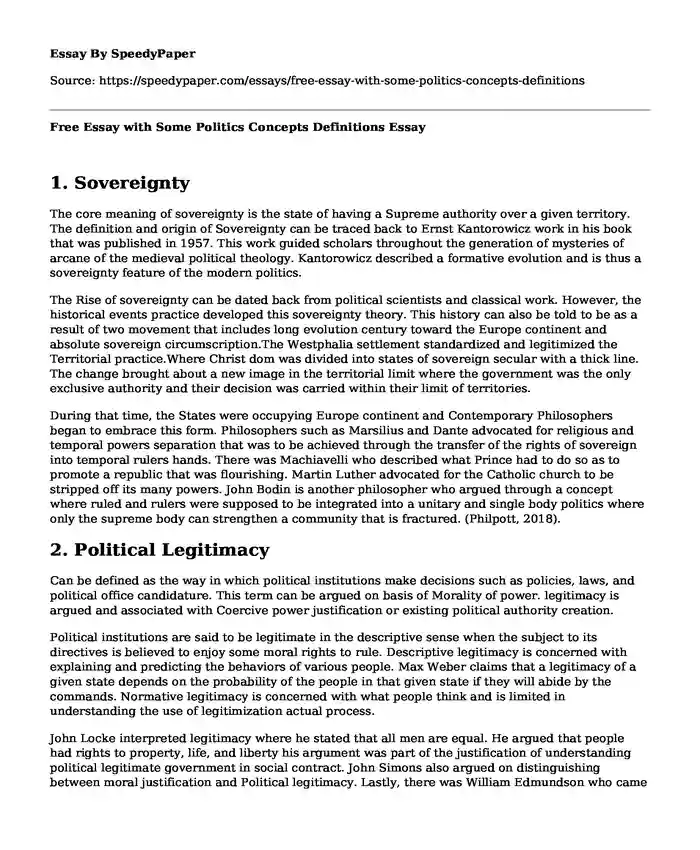
| Type of paper: | Report |
| Categories: | Political science |
| Pages: | 4 |
| Wordcount: | 867 words |
1. Sovereignty
The core meaning of sovereignty is the state of having a Supreme authority over a given territory. The definition and origin of Sovereignty can be traced back to Ernst Kantorowicz work in his book that was published in 1957. This work guided scholars throughout the generation of mysteries of arcane of the medieval political theology. Kantorowicz described a formative evolution and is thus a sovereignty feature of the modern politics.
The Rise of sovereignty can be dated back from political scientists and classical work. However, the historical events practice developed this sovereignty theory. This history can also be told to be as a result of two movement that includes long evolution century toward the Europe continent and absolute sovereign circumscription.The Westphalia settlement standardized and legitimized the Territorial practice.Where Christ dom was divided into states of sovereign secular with a thick line. The change brought about a new image in the territorial limit where the government was the only exclusive authority and their decision was carried within their limit of territories.
During that time, the States were occupying Europe continent and Contemporary Philosophers began to embrace this form. Philosophers such as Marsilius and Dante advocated for religious and temporal powers separation that was to be achieved through the transfer of the rights of sovereign into temporal rulers hands. There was Machiavelli who described what Prince had to do so as to promote a republic that was flourishing. Martin Luther advocated for the Catholic church to be stripped off its many powers. John Bodin is another philosopher who argued through a concept where ruled and rulers were supposed to be integrated into a unitary and single body politics where only the supreme body can strengthen a community that is fractured. (Philpott, 2018).
2. Political Legitimacy
Can be defined as the way in which political institutions make decisions such as policies, laws, and political office candidature. This term can be argued on basis of Morality of power. legitimacy is argued and associated with Coercive power justification or existing political authority creation.
Political institutions are said to be legitimate in the descriptive sense when the subject to its directives is believed to enjoy some moral rights to rule. Descriptive legitimacy is concerned with explaining and predicting the behaviors of various people. Max Weber claims that a legitimacy of a given state depends on the probability of the people in that given state if they will abide by the commands. Normative legitimacy is concerned with what people think and is limited in understanding the use of legitimization actual process.
John Locke interpreted legitimacy where he stated that all men are equal. He argued that people had rights to property, life, and liberty his argument was part of the justification of understanding political legitimate government in social contract. John Simons also argued on distinguishing between moral justification and Political legitimacy. Lastly, there was William Edmundson who came up with how to link legitimacy and authority through warranty thesis.
3. Citizenship
Citizenship is defined by focusing on a dimension that includes identity that is the legal status, political (political agents and legal members in a political community). The normative core of citizenship is that citizen should enjoy equal rights. There have been debates on minority and equal rights issues that have become a hallmark in the o liberal societies. This has led to political violence which has erupted as a result of trying to acquire this equal right. Complexity a scale of Liberal societies makes this practice less important in the lives of many citizens. Citizen has high expectations of the political democratic practice. However, most authors agree that global citizenship should not be legal and that it should have an importance in the political dimension.
4. Political Obligations
Political obligation is the state of the individual to have a moral duty or of the law in his or her given country. The political obligation in historical perspective can be categorized in explaining five theories that includes: Obeying the laws of the Socrates, the divine command, Social contract, obligation and utility and Kant on obligation and legitimacy. These are termed as theories of political obligation. They, however, do not exhaust the possibilities. Mokrosinska advanced on civil justice theory and acknowledged that her argument of civil justice combines associative theories and natural duty elements.
There are theories that have been developed to explain this term that includes hybrid theories, that have been undertaken by different philosophers. Gilbert's theory talks of joint commitment to a group or plural subject. Steinberger's theory seeks to combine natural duty approach and consent. Wellman's theory agrees with his point but he acknowledges his theory as a hybrid which seeks to combine natural duty with the argument from the fair play. There are others theories from Klosko, Jonathan Wolf, and Dudley Knowles that seek to call for multiple principle approaches. The theories conclude that there is no answer to political obligation problem because the problem has a lot of aspects. (Dagger and Lefkowitz, 2018).
References
Philpott, D. (2018). Sovereignty. [online] Plato.stanford.edu. Available at: https://plato.stanford.edu/entries/sovereignty/ [Accessed 13 Feb. 2018].
Dagger, R. and Lefkowitz, D. (2018). Political Obligation. [online] Plato.stanford.edu. Available at: https://plato.stanford.edu/entries/political-obligation/ [Accessed 13 Feb. 2018].
Cite this page
Free Essay with Some Politics Concepts Definitions. (2022, Mar 04). Retrieved from https://speedypaper.net/essays/free-essay-with-some-politics-concepts-definitions
Request Removal
If you are the original author of this essay and no longer wish to have it published on the SpeedyPaper website, please click below to request its removal:
- Essay Sample: Description of the Infectious Agent and Its Incubation Period
- Free Paper Sample on Global Health 101
- RE: Quality costs Memo.
- Free Essay Comprising the Christmas Movie Review: Miracle on 34th Street
- Free Essay. A Review of Telephone-Administered Behavior-Based Interview Technique
- Technology, Work, and Organizations. Paper Exampl
- Essay Example: Investment Project and Justification
Popular categories




